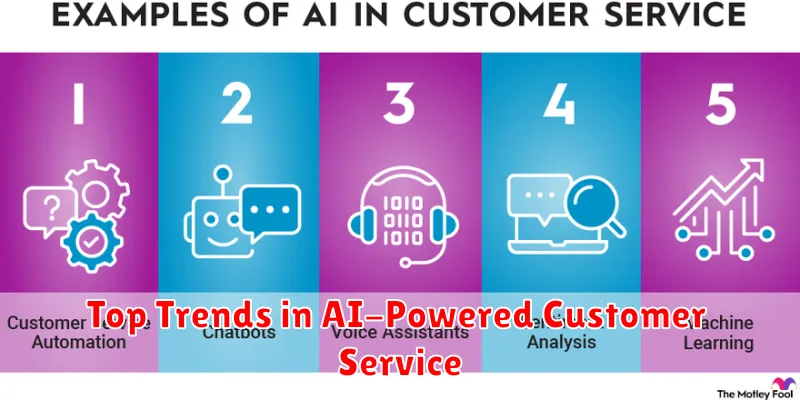The landscape of customer service is rapidly evolving, with Artificial Intelligence (AI) playing an increasingly crucial role. AI-powered customer service solutions are transforming how businesses interact with their customers, offering enhanced efficiency, personalized experiences, and 24/7 availability. This article explores the top trends in AI-powered customer service, highlighting the innovative ways businesses are leveraging AI to improve customer satisfaction and drive operational excellence. From chatbots and virtual assistants to predictive analytics and sentiment analysis, we’ll delve into the key technologies shaping the future of customer interaction.
Staying competitive in today’s market requires businesses to embrace these emerging AI trends. By understanding the potential of AI in customer service, organizations can optimize their support strategies, reduce costs, and cultivate stronger customer relationships. This exploration of the top trends will provide valuable insights for businesses looking to implement or enhance their AI-powered customer service offerings. Discover how machine learning, natural language processing (NLP), and other AI technologies are revolutionizing the customer experience and creating new opportunities for businesses to thrive.
Chatbots and Virtual Assistants
Chatbots and virtual assistants are transforming customer service by providing 24/7 availability and instant support. These AI-powered tools can handle a wide range of tasks, from answering simple questions to resolving complex issues.
Key benefits include reduced wait times, increased customer satisfaction, and lower operational costs. They free up human agents to focus on more demanding interactions, improving overall efficiency.
Advanced chatbots leverage natural language processing (NLP) and machine learning (ML) to understand customer intent and provide personalized responses. This leads to more engaging and helpful customer interactions.
AI-Driven Email and Ticket Triage
AI is revolutionizing customer service by automating the initial stages of email and ticket processing. AI-powered triage systems intelligently categorize and prioritize incoming customer inquiries based on factors like urgency, topic, and sentiment. This ensures that critical issues are addressed promptly by the appropriate support agent, minimizing resolution times and improving customer satisfaction.
These systems analyze the content of emails and tickets, automatically routing them to the correct department or agent. This reduces manual effort, frees up human agents to focus on complex issues, and ensures a more efficient workflow. Furthermore, AI can suggest relevant knowledge base articles or canned responses to agents, expediting the resolution process.
Voice Recognition in Call Centers
Voice recognition technology is rapidly transforming call center operations. This technology allows systems to automatically understand and interpret spoken language from callers. Reduced wait times are a key benefit, as the technology can quickly route calls, answer basic inquiries, and even authenticate callers through voice biometrics.
Improved agent efficiency is another major advantage. By automating routine tasks like data entry and call logging, agents can focus on more complex and nuanced customer interactions. This leads to increased customer satisfaction and reduced operational costs.
Furthermore, voice recognition enables valuable data collection and analysis. By transcribing and analyzing calls, businesses can gain insights into customer preferences, identify common pain points, and improve their overall service offerings.
24/7 Support and Instant Resolution

One of the most significant advantages of AI in customer service is the ability to provide uninterrupted support and instantaneous issue resolution. Customers no longer need to wait for business hours to receive assistance. AI-powered chatbots and virtual assistants are available around the clock, offering immediate responses to inquiries and resolving simple problems without human intervention.
This 24/7 availability significantly enhances customer satisfaction, particularly for global businesses catering to diverse time zones. It also allows human agents to focus on more complex issues, boosting overall efficiency.
Predictive Personalization
Predictive personalization leverages the power of AI to anticipate customer needs and proactively offer tailored solutions. By analyzing past behavior, purchase history, and browsing patterns, businesses can predict future actions and deliver personalized experiences. This may include recommending relevant products, offering proactive customer support, or tailoring marketing messages.
This approach moves beyond simple segmentation and allows for truly individualized interactions. Real-time data analysis is crucial for predictive personalization, allowing businesses to dynamically adjust offers and recommendations as customer behavior changes.
The Balance Between AI and Human Agents
Striking the right balance between AI and human agents is crucial for maximizing the effectiveness of AI-powered customer service. While AI excels at handling routine inquiries and providing 24/7 availability, human agents possess the empathy and nuance needed for complex or emotionally charged situations.
A common approach is to utilize AI as the first line of contact, filtering and resolving simpler issues. This frees up human agents to focus on higher-value interactions, ensuring customer satisfaction and optimizing resource allocation.

